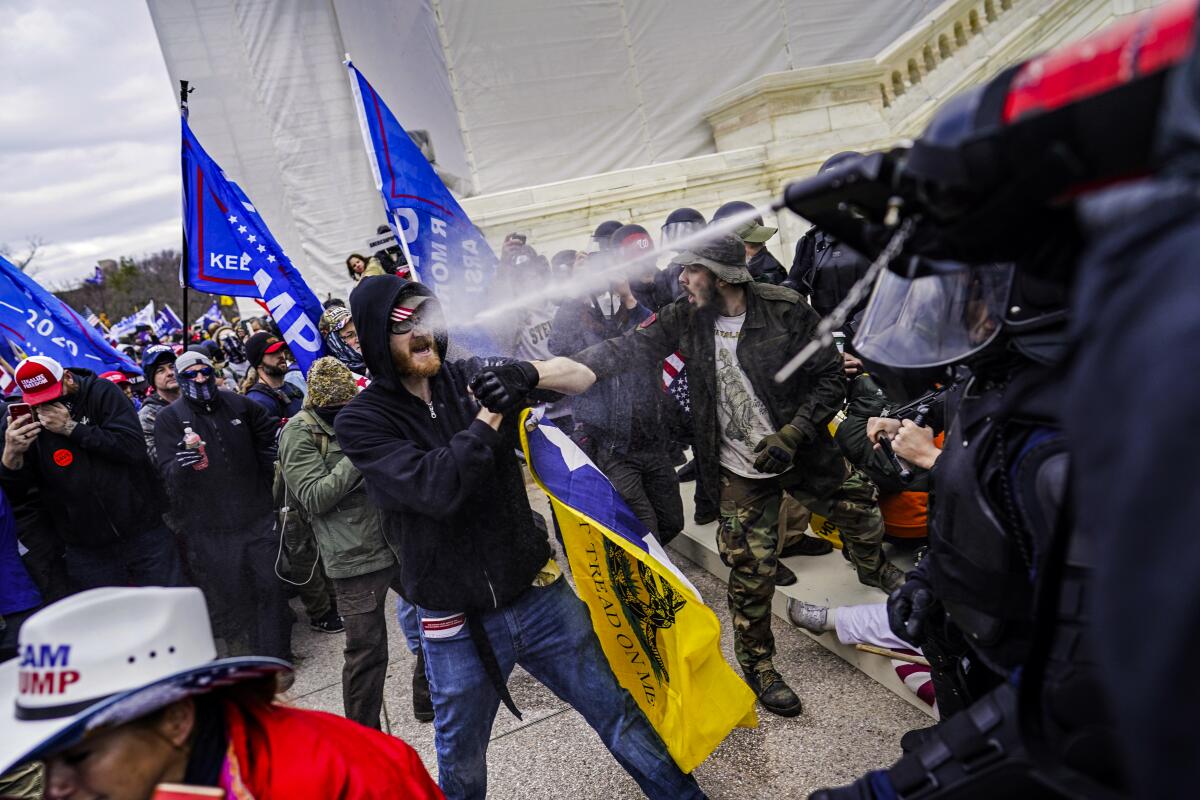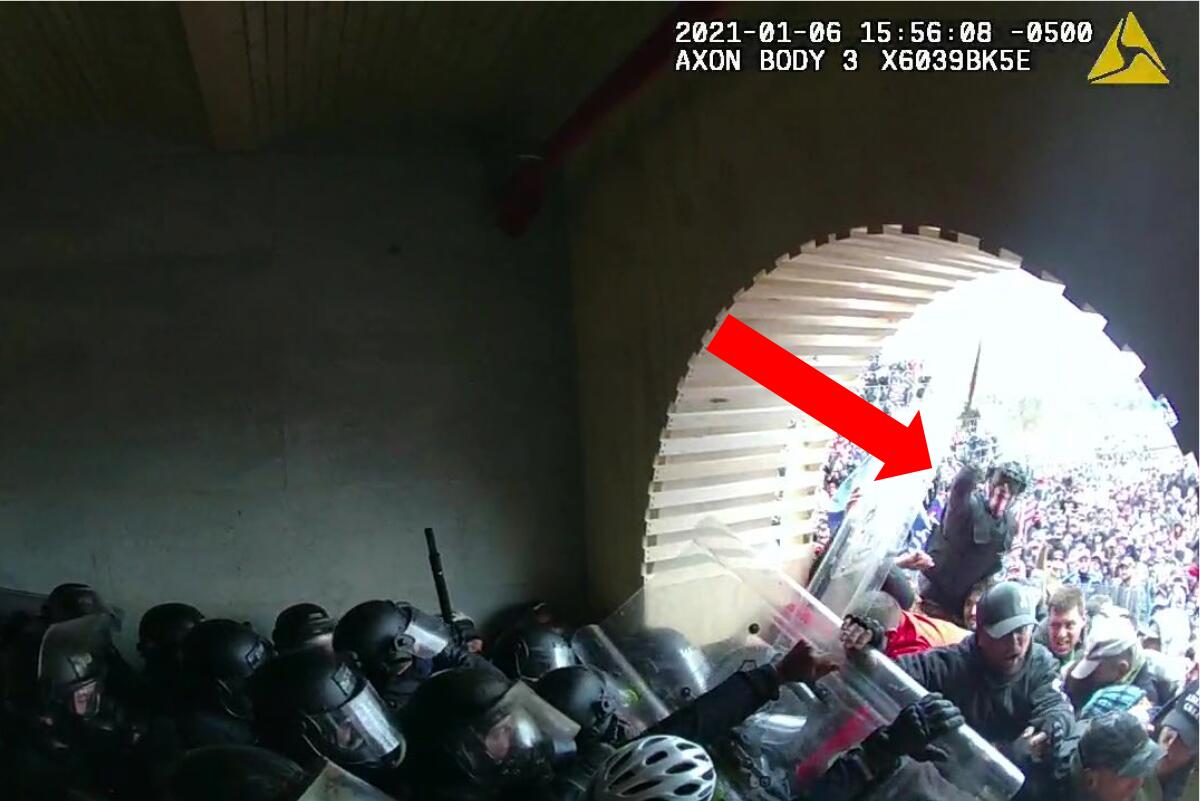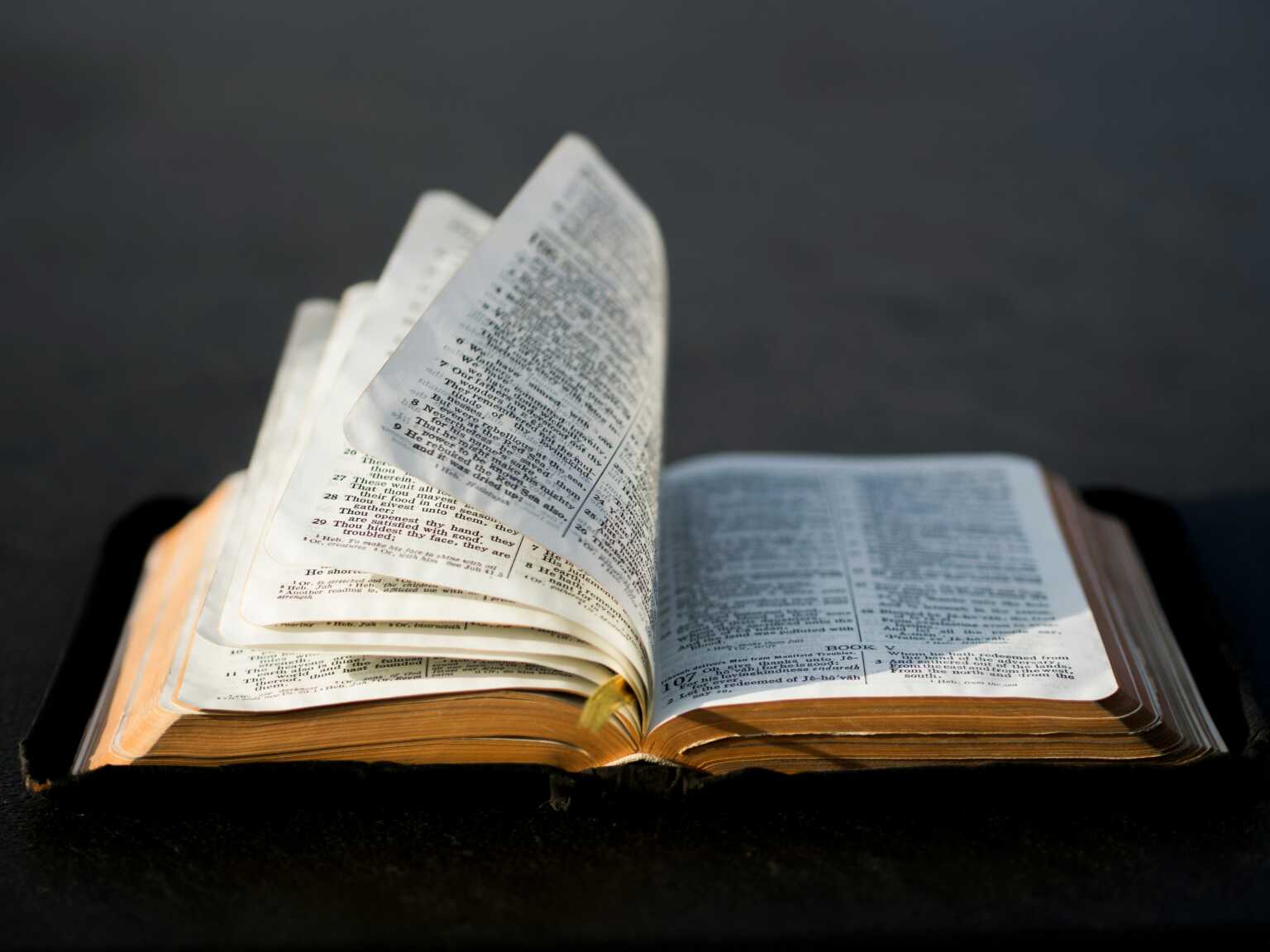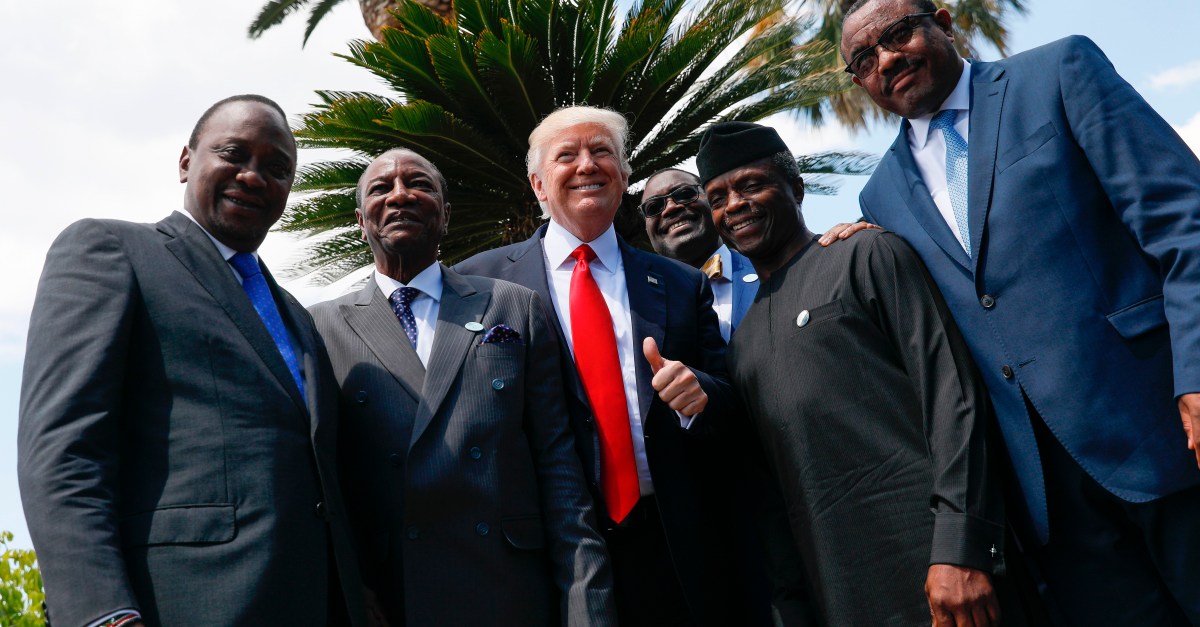Out of more than 1,500 criminal defendants charged in the Jan. 6, 2021, insurrection at the U.S. Capitol, David Dempsey is among the most notorious.
Dempsey, of Van Nuys, was accused by federal prosecutors of being “one of the most violent rioters” and sentenced in August to 20 years in prison — one of the stiffest penalties to date — after pleading guilty to assaulting a law enforcement officer with a dangerous weapon and breaching the seat of Congress.
Now Dempsey is among a large number of Jan. 6 defendants who are anxiously awaiting news from President-elect Donald Trump on whether and how he will make good on a sometimes muddled campaign promise to pardon them.

Annotated video from the Justice Department shows David Dempsey of Van Nuys stomping on police officers in the Lower West Terrace Tunnel at the U.S. Capitol on Jan. 6, 2021.
(Associated Press)
“We’re all on our heels and preparing for anything — whether that is nothing happening, or more individualized relief, or a blanket pardon,” said Amy Collins, a Washington-based attorney who represents several Jan. 6 defendants, including Dempsey.
“We really just don’t know how to expect this process to go, because of how unconventional Trump is. He’s full of surprises,” Collins said. “We have to be ready for anything, and for any guidance that may come in a formal or informal way.”
The president-elect’s supporters stormed the Capitol after a Trump rally on the National Mall, in an effort to block Congress from certifying Joe Biden’s victory in the 2020 election. Federal authorities have said 140 police officers were assaulted and millions of dollars in damage incurred.
Trump, who was federally indicted for his actions that day, has called Jan. 6 defendants “hostages” and “patriots” who had “love in their heart” when they stormed Congress.
At a CNN town hall in May 2023, Trump said he was “inclined to pardon many of them,” but couldn’t “say for every single one because a couple of them, probably, they got out of control.”
In an April interview with Time magazine, Trump said he would “absolutely” consider pardoning all Jan. 6 defendants. At a July gathering of Black journalists, he suggested those defendants were the victims of a “very tough system” that treated them more severely than racial justice demonstrators who have caused damage in other cities.
Since Trump’s election, his team has said he intends to follow through with his promises to help Jan. 6 defendants. Mark Paoletta, an attorney on the transition team, wrote on X this month that Trump was reelected to carry out an agenda that included “granting pardons or commutations to January 6th defendants and other defendants who have been subjected to politically-driven lawfare prosecutions and sentences.”

Conservative activist Virginia “Ginni” Thomas, the wife of Supreme Court Justice Clarence Thomas, walks with her lawyer, Mark Paoletta, to an interview in 2022 with the House panel investigating the Jan. 6 insurrection.
(J. Scott Applewhite / Associated Press)
However, Paoletta did not offer details. Trump’s team did not respond to requests for comment.
Experts said the path forward is largely up to Trump.
“He has pretty much unlimited authority to do whatever he wants once he takes office,” said Kim Wehle, a professor at the University of Baltimore Law School and the author of “Pardon Power: How The Pardon System Works.”
According to a Times review of federal court filings, Jan. 6 defendants with pending cases or appeals have sought delays as they await word from Trump; some have been granted, and others denied. Attorneys for Jan. 6 offenders already in prison said they are already gathering documentation so they can quickly apply for pardons once the process becomes clear.
“There’s an expectation that Trump is going to do it. He himself said so. But I’m not sure how this is going to play out, or when this is going to take place,” said Nicolai Cocis, an attorney for Derek Kinnison, a Lake Elsinore man who was sentenced to two years and nine months in prison in April after being convicted with a group of other California men of conspiracy to obstruct an official proceeding and other related charges.
The men were all accused of being part of the Three Percenters militia group, and of coordinating travel from California to D.C. to block Biden’s win. Among the group — known as the “DC Brigade” — was Alan Hostetter, a former La Habra police chief.

Alan Hostetter speaks during a pro-Trump rally he organized at the Orange County Registrar of Voters office in Santa Ana in 2020.
(Paul Bersebach / Associated Press)
Cocis argued Kinnison would be a good candidate for a pardon because he didn’t have a criminal record before Jan. 6, was not accused of committing any serious violence and did not enter the Capitol.
Another member of the DC Brigade was Russell Taylor of Ladera Ranch, who was sentenced to six months of home detention after pleading guilty.
Taylor, who prosecutors said wore body armor and carried a knife and a hatchet as he helped others overrun police lines, initially faced a much stiffer sentence but received leniency after agreeing to testify against Hostetter.
Dyke Huish, an attorney for Taylor, said they were “looking forward” to Trump making his plan for pardons clear.
Huish noted that pardon applications traditionally are reviewed by the Office of the Pardon Attorney, though Trump may wish to sidestep that process given its eligibility restrictions. He said he has studied President Carter’s use of an executive order shortly after taking office in 1977 to pardon thousands of men who evaded Vietnam War drafts.
Either way, Huish said he expects Trump’s transition team to issue guidance soon for the attorneys working Jan. 6 cases, because even if Trump’s intention is to grant “mass pardons,” many attorneys expect there to be some nuance or exceptions.

Rioters, fueled by President Trump’s claims of election fraud, charged the U.S. Capitol on Jan. 6, 2021, in an attempt to overturn the results of the 2020 election of Joe Biden.
(Kent Nishimura / Los Angeles Times)
“Not every Jan. 6 case is the same,” Huish said. “There’s a handful where they are going to have to take a close look, because there was violence and people were hurt.”
Collins, Dempsey’s attorney, declined to discuss his case in detail, citing his pending appeal. However, she did address the potential for a pardon in a recent request for an extension in his case.
She gave various reasons for the extension, including her own busy schedule, but also cited Trump’s election just days prior and his repeated promises to pardon Jan. 6 defendants.
Collins wrote that given “the high-profile nature” of Dempsey’s case and the severity of his sentence, which she said was the second-longest of all Jan. 6 defendants, Dempsey “might be viewed as one of the more appropriate candidates for such relief.”
Dempsey was accused of being front and center in the insurrection. Federal prosecutors alleged he used other insurrectionists as “human scaffolding” to climb to the front of the crowd, fashioned a flagpole and pieces of furniture into weapons and “viciously assaulted and injured police officers” for over an hour during the siege. They said he pepper-sprayed one police officer and bashed another so violently with a metal crutch that it cracked the officer’s gas mask and caused him to fall backward.

Video from the Justice Department shows David Dempsey throwing a pole at police in the Lower West Terrace Tunnel at the U.S. Capitol on Jan. 6, 2021.
(Associated Press)
The extension was granted, pushing the deadline for arguments on an appeal Dempsey has filed in the case to March, two months after Trump takes office.
Joe Allen, an attorney who has represented several Jan. 6 defendants, said many of the people who were at the Capitol were enamored of Trump and convinced they were carrying out justice on his behalf, and Trump “took advantage” of them.
Many still hang on Trump’s every word, he said, and “have some pretty high expectations of what Donald Trump should be doing for them now, [thinking], ‘We were in your army. Now we’re prisoners of war. So what are you going to do to save us?’”
He suggested Trump appoint a bipartisan committee to review all Jan. 6 cases and look for those where a pardon may be justified, because some of the people there “just kind of got caught up in the crowd.”
The Justice Department estimates it has charged 1,561 Jan. 6 defendants. Of those, 590 were charged with assaulting, resisting, impeding or obstructing law enforcement officers, and 645 have been sentenced to some period of incarceration, the department said. Nearly 980 defendants had pleaded guilty, and 210 others have been found guilty at trial. The department is still pursuing other cases.
Wehle, the Baltimore law professor, said Trump could issue a stark order declaring pardons for a list of named individuals, an entire cohort of defendants or everyone charged that day.
Regardless, individual defendants and their attorneys will have work to do, Wehle said, including filing motions for dismissal of their cases or for release that cite Trump’s pardon declaration as the legal grounds.
Jeffrey Crouch, a law professor at American University and an expert on the pardon process, said modern presidents have often relied on the Office of the Pardon Attorney, but Trump is clearly willing to take a different approach — having relied on that office for only 25 of his 238 clemency grants while in office.
“He opted to have requests evaluated by his own people most of the time,” Crouch said, and granted clemency “to his political allies, celebrities, military figures and others.”



Leave a Comment